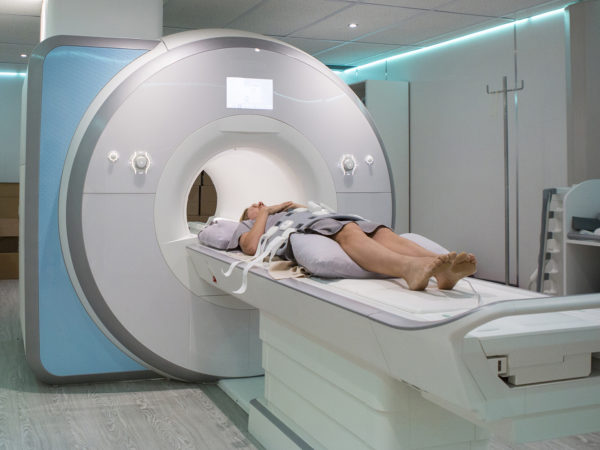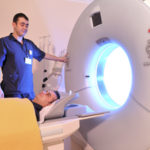Should I Have A Full-Body MRI Scan?
I recently read that Kim Kardashian had a full-body MRI scan just to make sure nothing was wrong. Should more people be having these, even if they have no symptoms? Should I?
Andrew Weil, M.D. | November 28, 2023

Magnetic resonance imaging, or MRI, became available in the 1980s and has revolutionized the world of medical diagnostics. It emits no radiation, provides a non-invasive examination of soft tissue, and has virtually eliminated the need for exploratory surgery. A safe, accurate look inside your body to make sure everything is okay certainly sounds tempting, but it’s more complicated than that. My answer is: No, unless there is a clear and compelling medical reason, no one should get a full-body MRI scan.
It may sound counter-intuitive to say I don’t recommend a scan that can find abnormalities. It can: a significant percentage of people who undergo these scans discover that they have vascular disease (including previously undetected strokes and heart attacks), colon polyps, even tumors. That’s not a reason to schedule a scan for yourself. In fact, it may be the best reason not to.
That’s because the results tend to set off what’s been called a “cascade of care” – additional imaging, biopsies, and possibly treatment – all of which carry the risk of side effects and complications. Many of the anomalies found on a full-body MRI are benign, but there is a measurable risk of harm with each procedure you may have to follow up on a finding.
The cost factor is also considerable. A full-body MRI can cost $2,000 or more and is unlikely to be covered by insurance without a medical reason for having it. Even though some companies are offering scans for less and claim that costs will continue to come down, the out-of-pocket expense for most people will be daunting. If the scan leads to additional testing and treatment, there will be more co-pays to make, deductibles to be met, and the additional costs of travel and time off work. On top of that is the incalculable cost of the anxiety around the entire process.
A 2023 article in the American Journal of Roentgenology reported that between 15% and 30% of all diagnostic imaging will find something unrelated to the reason for the scan. It drew a distinction between patients of different levels of risk, noting that those with low risk who have an incidental finding are likely to be overdiagnosed and overtreated. The paper also warned against the risk of “low-value and sometimes harmful care.” If you are at risk for a certain disease, by all means get screened for it. If not, save yourself the money, health risks, and anxiety these scans cost.
Equally alarming is the prospect that a full-body scan will not show any abnormalities, creating a false sense of security that tempts you to skip recommended screening tests. Those specific screenings are more targeted at your age and your risk factors and are much more important for you to have performed.
Commercial companies that are marketing full-body scans prey on fear. They tout the benefits of early detection of a cancerous tumor, with the opportunity to provide life-saving treatment while the cancer is small. What they don’t tell you is how often a small abnormality in your body is completely harmless and that leaving it alone will have no effect on your health or your longevity. Pursuing it, however, can have medical as well as financial implications. The anxiety, medical risks, and significant costs associated with follow-up are simply not warranted.
The best way to protect your health remains prevention in combination with appropriate medical care and screenings. Instead of an expensive and unnecessary full-body MRI scan I recommend the following:
For heart health, know your blood pressure, your cholesterol numbers, and your coronary artery calcium score.
Have your blood sugar levels checked regularly, and monitor them if you’re at risk for diabetes.
Eat a healthy, anti-inflammatory diet, get enough high-quality sleep, and stay physically active.
Get recommended screenings for breast, colon, lung, and other cancers. See the American Cancer Society’s guide to who should get screened, and when.
Andrew Weil, M.D.
Sources
Davenport MS. Incidental Findings and Low-Value Care. AJR Am J Roentgenol. 2023 Jul;221(1):117-123. doi: 10.2214/AJR.22.28926. Epub 2023 Jan 11. PMID: 36629303. pubmed.ncbi.nlm.nih/36629303/
Goehde SC, Hunold P, Vogt FM, Ajaj W, Goyen M, Herborn CU, Forsting M, Debatin JF, Ruehm SG. Full-body cardiovascular and tumor MRI for early detection of disease: feasibility and initial experience in 298 subjects. AJR Am J Roentgenol. 2005 Feb;184(2):598-611. doi: 10.2214/ajr.184.2.01840598. PMID: 15671386. pubmed.ncbi.nlm.nih/15671386/
Baumgart D, Egelhof T. Präventives Ganzkörperscreening unter Einbeziehung modern Bildgebung mit Hilfe der Magnetresonanztomographie [Preventive whole-body screening encompassing modern imaging using magnetic resonance tomography]. Herz. 2007 Aug;32(5):387-94. German. doi: 10.1007/s00059-007-3020-1. PMID: 17687528. pubmed.ncbi.nlm.nih/17687528/












